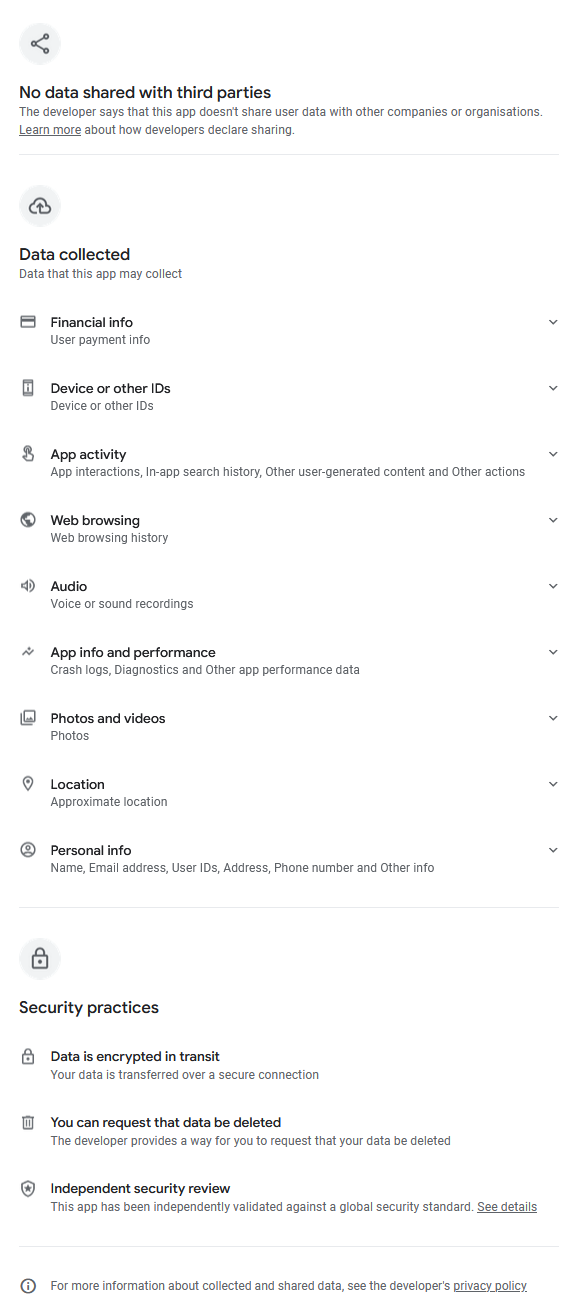Found this notification this morning on my pixel 6.
Iceraven hasn’t burned me yet
Looks like its enshittification continues unabated :/
That’s a regular notification, which would happen for any application whose data policy is changed on the Play Store page. These policy are as declared by the app publisher. This would be the same for any application that didn’t check that “sharing data with third party” box earlier, then checked it later on.
I don’t get what your comment is getting at. I don’t view this post as saying anything special or unique about the notification. I see it as a warning that Firefox is now doing this.
Have you read all the other replies? “Google mad”, “Google putting Firefox in the dirt”, “False info”, etc.
I interpret top level comments as responses to OP unless they say something otherwise.
The legal definition of “sell” has changed in several major markets, and that’s (supposedly) why Firefox has recently changed their terms. The word “sell” is now ostensibly broad enough to include “give to anybody for any reason”, including if you use Firefox for any reason where you would legitimately want and need Firefox to give (“sell”) your data - for example if you use it for: literally any shopping or even just browsing store pages; any interactive (real world) maps where you may want to use your location; any searches where you want local businesses to be listed; any search engine that may want to use your location to aid in results; etc. etc. etc.
Any legitimate exchange of data can now be construed as “selling” because of the new legal definitions, regardless of if anyone is actually selling anything.
It’s very possible that nothing has changed - that Firefox hasn’t started selling user data, they’re just updating their terms (and this app listing) to reflect the changes in the legal definitions of “sell”.
The whole “legal definitions are why we changed” is definitely what they’re rolling with, but I don’t think a lot of what you said is correct. Websites selling data is not the same as firefox selling data. If a site sells your data while you’re using firefox, that is in no way shape or form involved with firefox. That’s also not what they are claiming. They are strictly talking about the data that firefox directly collects and distributes. It would include search results if you searched via the address bar, I suppose. They have sold data for a while, but it’s anonymized (https://support.mozilla.org/en-US/kb/sponsor-privacy).
Firefox is free to use, but it costs a lot of money to develop. They need money, nobody here is denying that. Many users on this platform have tried to avoid any form of data collection as much as possible (myself included) so they would rather pay to fund it (though many don’t). However, most people would rather pay for the service with ads and data collection. Because to them, it’s basically free. Most users would never even consider moving to Firefox if it was paid. They could offer two options, one paid and one “free”, but they haven’t done that yet and it’s not clear if they plan to.
Most importantly, it’s really about being transparent. If they need money, they shouldn’t try to hide the fact they are selling anonymized data by saying “We never sell you data” or to be like “oh no, we are doing it because of legal definitions” when in reality they are selling data. I get it’s a PR movement, but most of the people intentionally using Firefox are tech savvy people wanting to get away from Google’s big brother approach. I get people defending Firefox, and I also get people hating on Mozilla, but we should also be clear about the reality. Firefox is, and has been selling your data (in some form), but now the laws are changing to make it more clear that what they’re doing is in fact selling data.
Which parts do you disagree with? I’m not talking about websites selling your data after you access them through Firefox, I’m saying that now - with new definitions of “sale”/“sell” - that Firefox giving anybody any data for almost any reason can be legally construed as “selling”. This isn’t just the case for Firefox, it’s the case for literally any web browser, and anything that can access the internet for any reason.
Yes, I thought about including the fact that Firefox does engage in ad-based revenue, and I suppose I should’ve, but Firefox is pretty upfront about this and allows users to opt out of targeted advertising - and this has been the case since long before this past week or two. These ads only appear on the “new tab” page, and only if you consent to seeing them. Anybody who’s dropping Firefox for this recent controversy seens to be missing that. It’s very possible (and personally I think it’s likely) that nothing at all has changed from within Firefox.
This comment reads differently to me than the one of yours I replied to. When you said:
for example if you use it for: literally any shopping or even just browsing store pages That read to me like you were talking about the store itself, and not firefox.
Regardless, I agree with what you’ve just said more. My argument is moreso that Firefox has been selling data (so nothing really has changed with them), but now they’re being required to state that they’re selling data. I get that Mozilla doesn’t want to be lumped in with “selling data” groups, because it can be done in very extremely different manners with varying levels of invasion on privacy. But I also think they should have been more up front about where they get some of their revenue, and not tried to be like “We never sell your data” while literally having sponsored suggestions (both on the new tab page, and website suggestions in the address bar).
As for what the current drama impacts on this? Nothing, really. Other than they are being required to disclose that they sell data, and their getting backlash because they’ve been trying to pretend they don’t. Now that they’re lumped in with the “data selling” corporations in peoples minds (even though they’re very different than google), who knows if that will give them the extra room to be a bit more invasive with their data collection. They’ve already crossed the largest PR hurdle, so the future incremental changes would be much easier. There’s no guarantee, but with traditional enshitification, it wouldn’t surprise me.
use ironfox or fennec
Either die a hero……
“Quick! Jump to chrome instead!” - Google spokesperson
God damn why’s the world so shit
God damn why’s the world so shit
Society empowers and encourages shitty people that only care about their own kind/tribe, is why.
Society empowers and encourages shitty people that only care about
their own kind/tribethemselves, is why.
It really is. Literally everything is shit and I’m so fucking over it.
i know, thats some really late stage capitalism bullshit.
This is the Bad Place
My understanding is this is due to regions broadening the definition of “sell” to include any form of personal data transfer. So Mozilla giving location info (with consent if you enable “ask every time” in the permissions) to websites to look up local store hours or whatever is “selling data.”
AFAIK, nothing has changed in Firefox.
Get ironfox?
fennec vs ironfox opinions?
I would love to see a real comparison.
deleted by creator
- Fennec - Firefox build with some proprietary stiff removed; repo
- IronFox - Firefox fork (forked from Mull) with a bunch of hardening changes (notably
resistFingerprintingenabled); repo
IronFox is more ambitious, which means higher maintenance load and more likely to fall behind. Fennec is much simpler, so less likely to fall behind, but also doesn’t change much from Firefox.
I’ve not heard of ironfox before this thread! Could you possibly link it? Doesn’t seem like it’s on FDroid or IzzyOnDroid
In addition to what others have said, it can be downloaded from the Accrescent app store:
Never heard of that, what’s the benefit over F-Droid?
GrapheneOS posted this on Mastodon about a month & a half back:
The main difference is of philosophy of trust. With F-droid you trust F-droid to build the binary from the developers’ source code. With Accrescent, you trust the developers to build the binary from the source code.
With F-droid you trust F-droid to build the binary from the developers’ source code
Not when using a self-hosted F-Droid Repo - which is the case for Ironfox.
Yeah that’s like any 3rd party repository
I wish more projects hosted their own F-droid repo and kept it up to date. FUTO has one for their stuff (Grayjay, FUTO Keyboard, etc), but it’s frequently outdated, whereas Bitwarden and a few others I use do a good job.
Maybe Accrescent is what I’m looking for. I just want a store that:
- automatically updates when devs push a release
- checks signatures
- has a good selection of FOSS apps
I basically want fdroid, but faster updates.
So Accrescent is more like the classic play store or Obtainium?
In the play store you’re trusting Google and the developer.
I’m not sure how obtainium works. But if you download binaries from GitHub, you’re trusting the developer to accurately build their source code into the binary without adding anything. You’re also trusting GitHub implicitly – way back when, source forge was sometimes adding malware to downloads iirc.
F-droid is kind of cool in that they are saying, “we will ensure for you that the code you execute is the same as the open source code you can read”. But this added level of insurance comes with downsides – like sometimes it’s harder for the developer to make their code build properly, or maybe updates take longer.
And here I’m trusting Accrescent to actually deliver me an executable that has not been tampered with
You have to add IronFox’s repo in F-Droid before you can install it from there. This is their Github link.
Thanks
its for android, mobile.
Duh
IronFox is on F-Droid. That where I got it from at least
I had already downloaded and installed Ironfox (FF Android fork) on my phone and have been using it for a week or so. It works identically to FF for android. Ublock Origin is working in Ironfox too.
Pot Calling Kettle… etc… 🤣
I know, right, the fucking balls of Google to fucking say this
Because they are legally obligated to mention it?
…except they don’t for their own browser.
It’s literally there.

Are they? What law?
Probably GDPR if I had to guess. Seems like anything decent these companies do can be directly traced back to GDPR.
Edit: guys, “probably” means that I’m unsure.
No GDPR does not require google to display app permissions like that…
Your just making things up.
Do you want the short or the long version?
A link to it will do
Show me where I made something up, boss. Or do you not know what “probably” means?
deleted by creator
Do you? Because made up satistics are still made up.
This is how misinformation starts.
If your not sure, google it before commenting. For the sanity of the internet.
This is not at all a pot kettle situation, there is no reason to warn about Firefox.
There is: default search results on FF have always legally been sold to Google, the public didn’t know since there were no terms of service or mention by FF whenever they uploaded the android version on the playstore that their users data would be collected and some be sold. Position is one of the data that may be sold as it could be used by Google to dermine which localised version of the search result is the best one to serve
And it’s not going to be Google in the future: it could be Bing, startpage, ecosia, qwant etc… As long as someone pays, then the results are sold and there needs to be a warning to users.
the public didn’t know
That’s not true, for many years Firefox was basically financed by Google for being the default search engine, because Google didn’t want Microsoft to monopolize Internet Browsers. Everybody who had the slightest interest knew that.
But that’s completely irrelevant, it’s a very marginal source of revenue today, and Firefox does not sell user info to Google. So it’s on Google to warn about using Google search.
The only reason for the change in Firefox privacy terms was for clarification. For instance any information given to Firefox, does not grant Firefox ownership of it. (opposite of for instance Facebook)
That’s a guarantee of user protection, not the opposite. Firefox has a very limited scope of “using” user data, like for instance storing links with Firefox, so they work across multiple devices.
There is no “harvesting” of user behavior or information.https://techcrunch.com/2025/03/03/mozilla-rewrites-firefoxs-terms-of-use-after-user-backlash/
Google warning you about Mozilla is just peak fucking irony
Been using Libre Wolf, no issues so far. Fuck Firefox
Librewolf is Firefox plus some light patches, and as such depends entirely from Firefox.
It looks like they have a team and it’s open-source. It’s a gamble, but I’m guessing the death of Firefox would probably be a boon, not a hinderance, depending on who supports what from there.
Does libre wolf have an android app?
Fennec but I think it still shares some data
Thanks for that
IronFox is the closest alternative. F-Droid repo here:
Thank you
Dead link 😢
Do you have F-Droid installed? Not to pull a docker, but it is opening for me on 2 separate devices.
Deactivate from settings Have https always on, protection against tracking on strict, data collection and daily ping on off.
And that’s it.
calyxos here I come
Well, if there was any doubt before, with the weird ToS p.r. dance they were doing last week, now we know, for sure.
I’ve already switched to LibreWolf on the desktop. Is there a good non-Firefox browser for Android available?
IronFox, Fennec, Mull, Tor Browser
Mull is supposedly no longer being developed.
Good to know! I primarily use IronFox.















